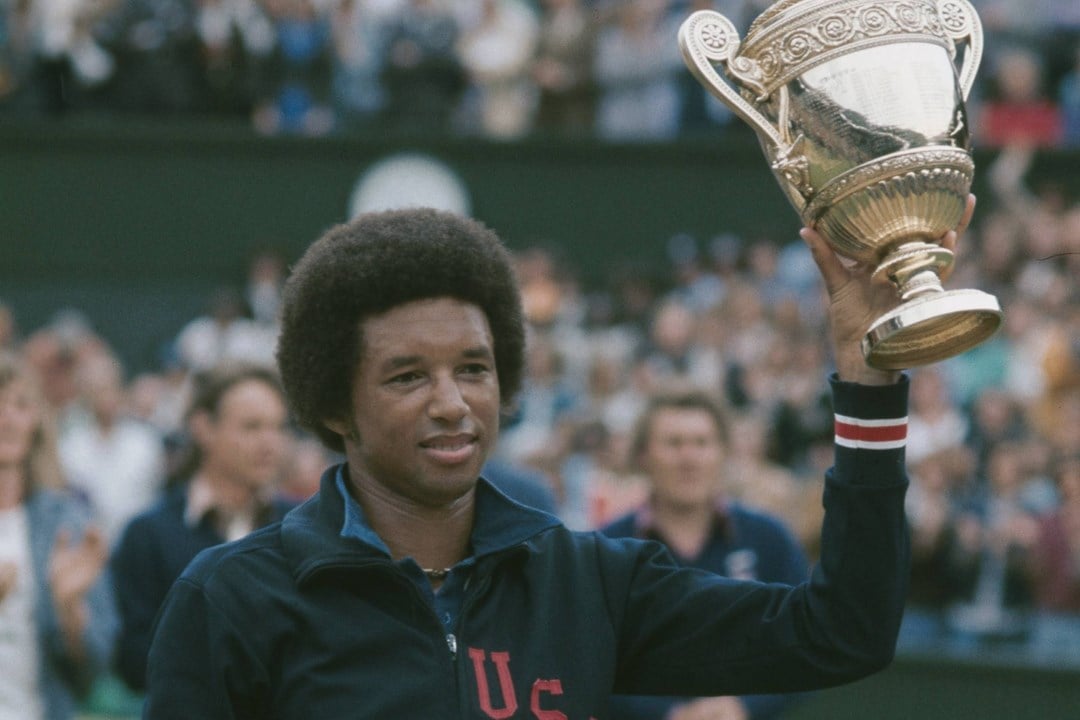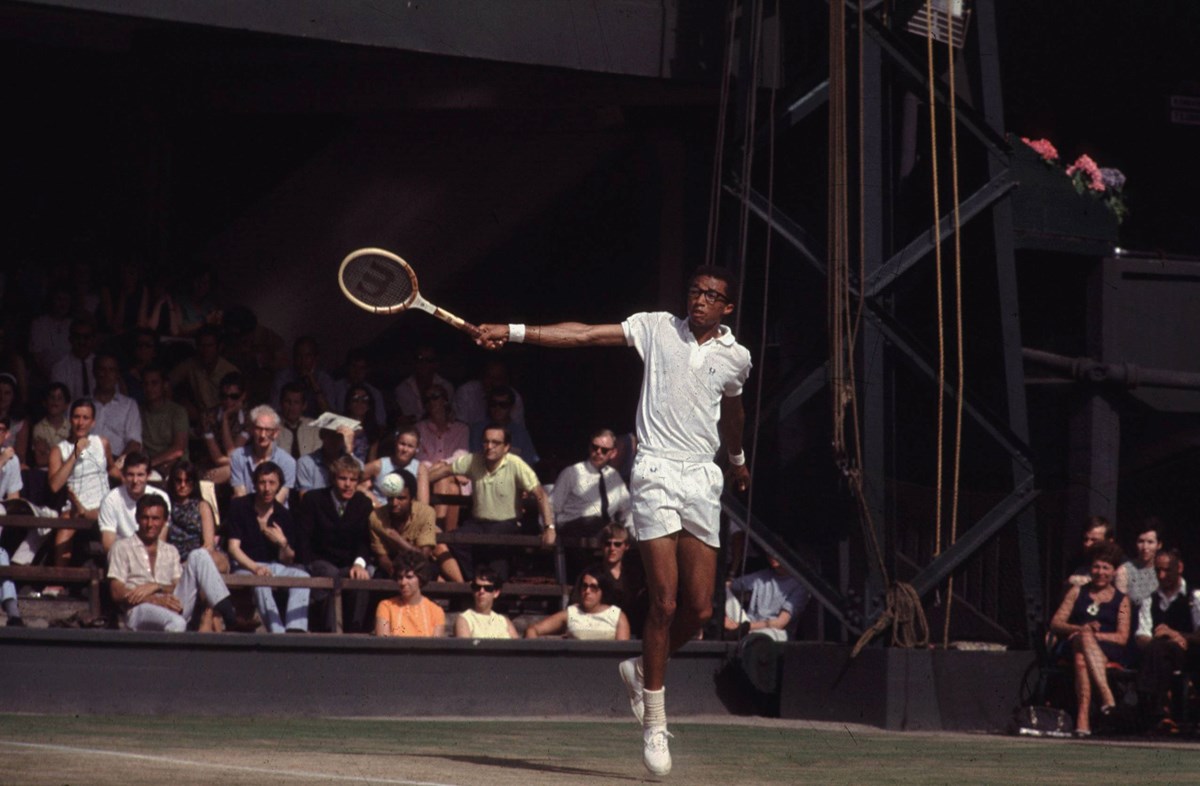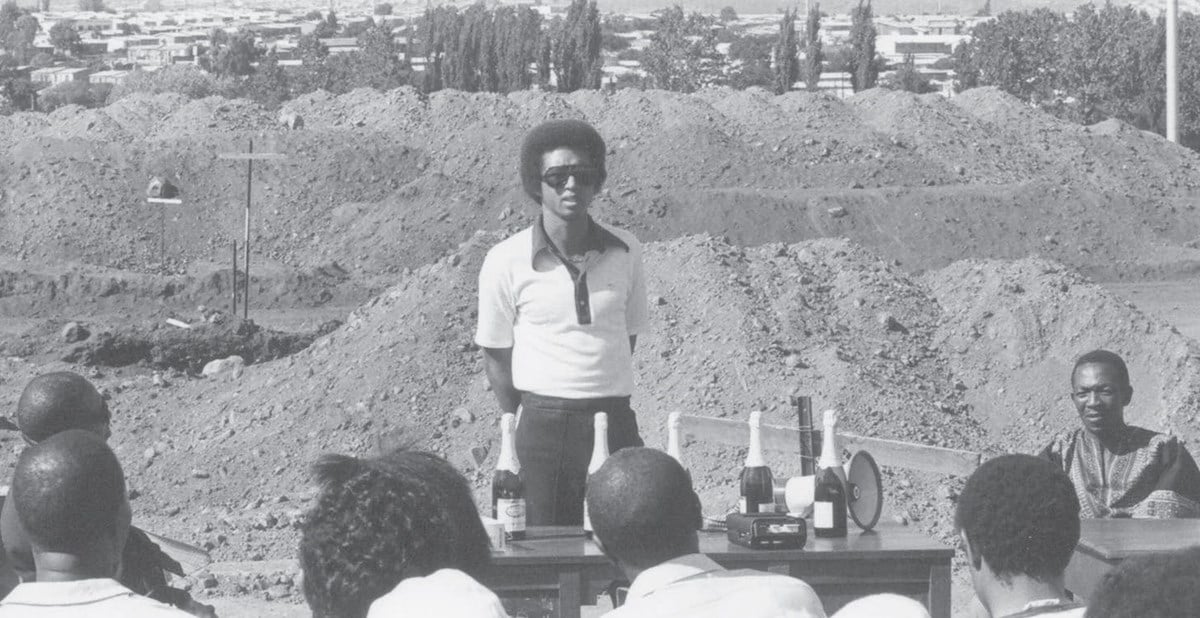
"Activist, historian & inspiration to so many” – remembering Arthur Ashe 50 years on from his Wimbledon title
• 4 minute read
Richard Evans is a venerated British sports journalist who has been writing about tennis since 1960 and was the first ATP Director of Communications in 1973.
As we mark the 50-year anniversary of Arthur Ashe winning Wimbledon, Richard reflects on the man he knew well and what made him such an icon.
I first glimpsed him by standing on tiptoe while passing through the walkway next to the old No.1 Court at Wimbledon.
Stretching, you could just see over the heads of the spectators and there he was – a tall, slim young man about to crack a serve. There were plenty of them in their Wimbledon whites. But there was only one of him. Arthur Ashe was black and this was the 1960’s.
News of his arrival on the old amateur tennis tour (tennis only went Open, admitting pros at major tournaments, in 1968) had spread around the circuit and most of us wondered what to expect.
Muhammad Ali was about to make his loud-mouth presence felt in the sporting world but Ashe was not one of those. Quite the opposite, in fact. In his early teens, Arthur had left the home of his father, a Parks policeman in Richmond, Virginia to go and live with a Dr Robert Johnson in nearby Lynchburg. It was a move that helped shape his life.
Dr Johnson, a tennis coach and teacher, taught him many things but nothing as important as the advice he gave on how a young black man should survive in a lily white world. “Never give the white man an excuse to criticize you,” Johnson said.

Not everyone would have been able to follow that stricture. But Ashe’s temperament allowed him to follow it to the letter. The only time I ever saw him lose his temper was over the behaviour of the wild Romanian Ilie Nastase whose constant interruptions during their match in the round robin phase of the ATP Masters in Stockholm in 1975 tested Ashe’s patience too far.
Picking up his rackets he walked off court – thus defaulting the match and putting himself in the wrong. The Supervisor, Horst Klosterkemper, tried to explain to a seething Ashe in the locker room (as Nastase, embarrassed, hid behind a shower curtain) that the rules said a default was required if a player left the court. “Don’t tell me about the rules – I WROTE them,” Ashe screamed. I stood four feet away…stunned. I had never heard Arthur scream before. Nor did I ever again.
After a committee meeting, it was decided to default Nastase and re-instate Ashe – not that it mattered much because, with the round robin format, Nastase still had two matches to play and went on to win the tournament – behaving himself. But Ashe was correct about writing the rules.
He had taken over from Cliff Drysdale as just the second President of the fledgling Association of Tennis Professionals (ATP) and, after canvassing opinions during the French Open at Roland Garros, he would come to my ATP European Director’s office near the Champs Elysees to write up his notes, amending the existing rules to fit the requirements of a totally professional tour.
It offered evidence of a diligence that carried him through his life – using an enquiring intellect that would transform him into a careful but dedicated activist, historian and inspiration to so many.
The manner in which he conducted himself through fraught and sometimes frightening situations always echoed back to Dr Johnson’s teachings. Once, during an NAACP meeting the firebrand Jesse Jackson told him, “The problem with you, Arthur, is you are not arrogant enough!” Ashe was unmoved. “You do it your way, Jesse, and I’ll do it mine.”
I had witnessed Ashe maintain that philosophy on numerous occasions, none more so than during his historic visit to South Africa in 1973. Owen Williams, the South African Open promoter, had persuaded the Afrikaaner Government to change its mind and allow Ashe to become the first black player to compete in their Championships. Ashe was officially welcomed as an ‘Honorary White” – a term he hated as much as the maid calling him ‘Master’ at the house where he was staying – and was given a free reign to roam as he chose.
A local South African poet, Don Mattera, who had written an amazingly perceptive poem about Ashe, had also arranged for the celebrated visitor to meet with a hall full of black journalists. The place was hot and humid and the mood restless to the point of antagonism.
As I edged past the back rows, I heard a man mutter “Uncle Tom.” Others articulated the thought by saying out loud that they resented Ashe’s visit because he was just playing into the Government’s hands and would leave them to go back to his comfortable world.
We waited apprehensively for Ashe to respond. “I am here because I cannot criticize what I have not seen,” he said, expressing a logic that quietened the journalists even if several clearly remained unsatisfied.

The air felt good outside and we did not have to worry about lack of air conditioning when Arthur was invited to talk to a pro-Government professor in the gardens of Stellenbosch University. Despite interruptions by some of the professor’s students trying to justify apartheid, the meeting was conducted in a civil manner until finally, Ashe brought it to a close with a question as direct as his first serve.
Pointing to the President of the Coloured Tennis Association who had accompanied us, smartly turned out in his green blazer and white trousers, Ashe said, “This has been an interesting talk, Professor, but please explain to me why it is that YOU can vote and yet the President here cannot?”
There was a pause. “To that question, Mr Ashe, I am afraid I have no answer.”
With Owen Williams’s help, Ashe returned to South Africa several times to help finance and build a Tennis Centre in the Township of Soweto which is still there today - one of many reminders of what exceptional people can achieve. And like the way in which he changed his entire style of play in order to soft ball Jimmy Connors to defeat in that memorable 1975 Wimbledon final, Ashe was always ready to go the extra mile in search of a better outcome, a better world. Or as the great sports writer George Plimpton said, “Arthur’s thinking was always broad minded, relieved of cant or bias; concerned with excellence in its finest sense. What a special and remarkable American he was.”
Inclusion in tennis
Find out more about the LTA Inclusion Plan and what we're doing to help open up tennis across Great Britain.





